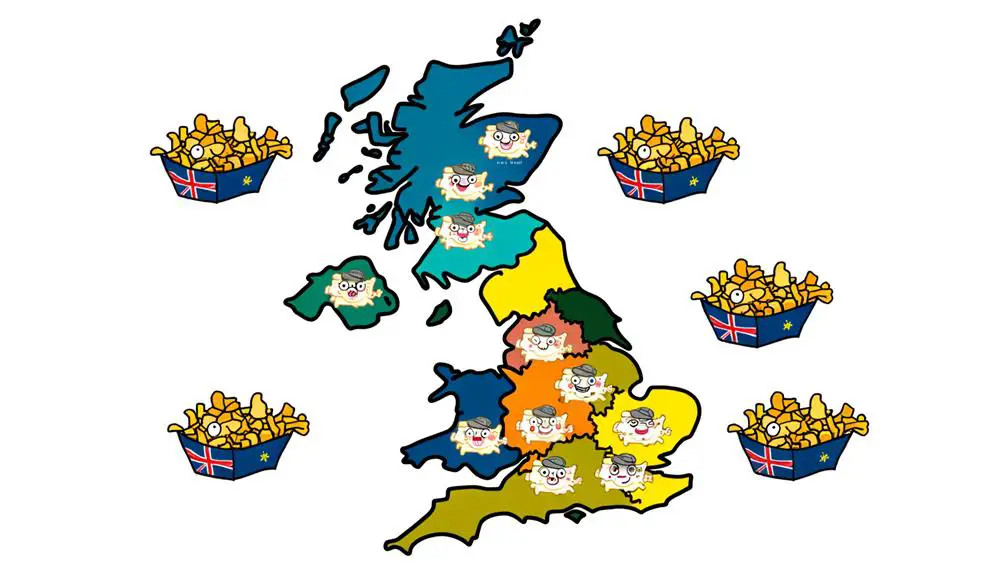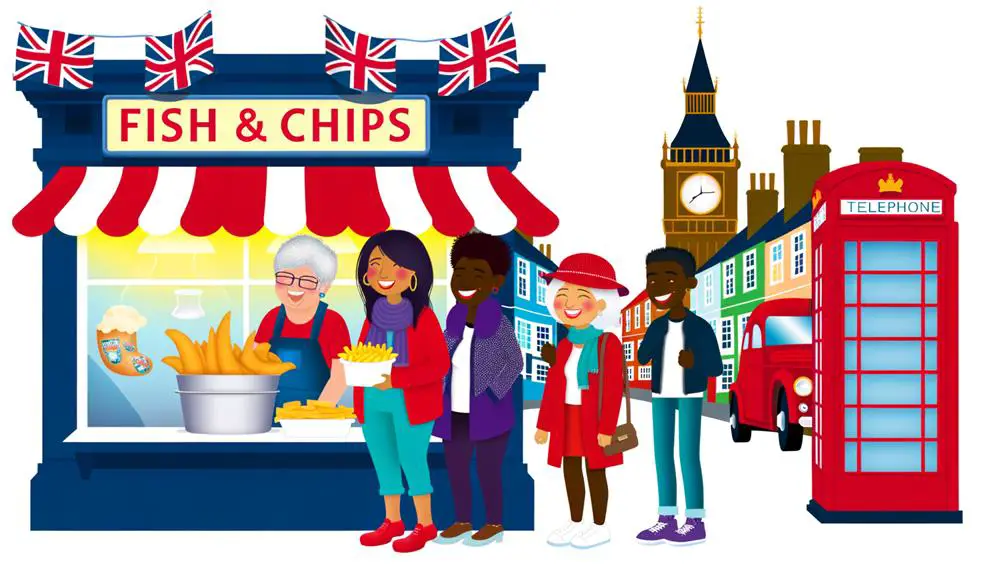In British slang, "chippy" isn't just a word; it's a reflection of culture and history. It originally described carpenters, a nod to their skill and craftsmanship. Today, it's more commonly tied to the beloved fish and chip shops, places of culinary delight and community. But "chippy" isn't static—it morphs with context. In sports, it signifies a game turning aggressive. Among friends, it can be a term of endearment or express frustration, showcasing its emotional range. Regional differences add another layer, with variations across the UK. Understanding "chippy" gives you a taste of British linguistic creativity and cultural identity, hinting at the rich stories behind everyday expressions.
Key Takeaways
- In British slang, 'chippy' affectionately refers to fish and chip shops.
- It can also denote a carpenter, highlighting the term's versatility.
- The term conveys emotions, from fondness among friends to mild frustration.
- 'Chippy' reflects British culture, especially in communal dining practices.
- Its usage indicates a dynamic and evolving British colloquial speech.
The Origins of Chippy

While the term 'chippy' has become synonymous with British culture, its origins can be traced back to the early 19th century, where it initially described carpenters before evolving to refer to fish and chip shops. This linguistic evolution reflects the dynamic nature of language, particularly within the context of socio-economic changes. The word 'chippy' itself is a demonstration to the adaptability and creativity of colloquial speech, embodying the essence of word origin and its journey through time.
Delving deeper into the roots of 'chippy', you'll find that its original association with carpenters is not merely coincidental but indicative of the term's etymological richness. This shift from a profession to a popular culinary destination encapsulates the fluidity of language, where meanings shift and new connotations emerge. The development of 'chippy' from a trade-specific term to a widespread colloquialism underscores the influence of societal developments on language. As communities evolve, so do the words they use, painting a vivid picture of historical and cultural shifts through the lens of linguistic changes. This exploration into 'chippy's' background offers a fascinating glimpse into the tapestry of language, where every term carries layers of history and meaning.
Chippy as a Fish and Chip Shop
Understanding the evolution of 'chippy' sheds light on how it has come to symbolize more than just a trade, embodying the cherished British institution of the fish and chip shop. This term has surpassed its humble beginnings to represent a cornerstone of British culinary culture, where the combination of fried fish and chips offers a comforting symbol of simplicity and tradition. The essence of a chippy isn't only in its menu but in the rituals that surround it, including the varied sauce options and the anticipation around opening hours, which often indicate the end of a workday or the start of a weekend treat.
| Feature | Description | Importance |
|---|---|---|
| Sauce Options | Offering variety from traditional to innovative sauces | Enhances the experience |
| Opening Hours | Typically late afternoon to late evening | Suits diverse schedules |
| Community Role | Serves as a local gathering point | Strengthens local bonds |
| Menu Diversity | Beyond fish and chips, often includes pies, sausages | Caters to wider tastes |
A chippy stands as more than just a mere eatery; it's a cultural artifact that reflects the British ethos of communal dining and comfort eating. Through its sauce options and opening hours, it caters to a broad spectrum of society, making it a beloved institution across the UK.
The Carpentry Connection

Beyond its culinary significance, 'chippy' also intriguingly links to the world of carpentry, revealing a multifaceted dimension of British slang. When you investigate into this context, 'chippy' isn't just about fish and chips; it embodies the craft and expertise of carpenters. This term, affectionately used to refer to carpenters, highlights not just the profession but also the pride in woodworking techniques that have been honed over generations.
In the intricate world of carpentry, 'chippy' connotes a certain reverence for the skillful manipulation of wood, transforming it from a mere raw material into functional and often artistic creations. It's a nod to the meticulous attention to detail, the precision in cutting, shaping, and assembling wood pieces that characterizes the trade. Moreover, the term subtly acknowledges the importance of tool maintenance—an aspect of the profession that's as vital as the craftsmanship itself. A 'chippy' takes pride in their tools, understanding that well-maintained equipment is essential for achieving the finest workmanship.
Analyzing 'chippy' in this light offers a deeper appreciation for the term, connecting it to the tradition, skill, and dedication inherent in the carpentry profession.
Chippy in Sports Commentary
In the dynamic world of sports commentary, 'chippy' takes on a unique connotation, suggesting a game or match marked by increased aggression or competitiveness. When you hear a commentator describe the action on the field or court as chippy, they're highlighting the intensifying physical and mental battles between players. This term isn't just about the game's pace or a high score; it's about the undercurrents of rivalry and the heated interactions that push athletes to their limits.
Delving deeper, chippy moments often reveal the complex player dynamics at play. These are the instances that test not only physical prowess but also strategic thinking and emotional control. A chippy game can sometimes lead to unsportsmanlike conduct, but more often, it showcases athletes' commitment to their team and the game itself. It's in these heated exchanges that true sportsmanship can shine, as players navigate the fine line between aggression and fair play.
Understanding 'chippy' in this connection enriches your appreciation of the sport. It's not just about aggression for aggression's sake; it's a reflection of the players' passion, the historical rivalries, and the high stakes of competition. As a fan, recognizing the chippiness of a game adds a layer of depth to your viewing experience, turning an ordinary match into a thrilling spectacle of skill, strategy, and spirit.
A Term of Affection

While we've explored 'chippy' in the competitive world of sports, it's worth noting that the term also holds a cherished place as a term of affection in everyday language. In the rich tapestry of British slang, affectionate nicknames carve out a special niche, offering a glimpse into the cultural attitudes towards familiarity and endearment. 'Chippy' transcends its surface-level meanings to become a verbal expression of fondness, often used among close friends, family members, or partners. This duality in usage highlights the versatility of slang, adapting and evolving based on context and relationship dynamics.
Analyzing 'chippy' as an affectionate term, it's fascinating to see how verbal expressions of affection reflect social bonds and intimacy. Unlike its more contentious use in sports, where it signifies aggression or competitiveness, in personal interactions, 'chippy' transforms into a symbol of warmth and closeness. This shift underscores the importance of context in understanding slang; the same word can convey drastically different emotions depending on the situation. As an affectionate nickname, 'chippy' isn't just a term—it's a linguistic representation of the multifaceted nature of human relationships and the nuanced ways we express love and affection.
When Chippy Means Frustrated
Surprisingly, 'chippy' can also express frustration, revealing a nuanced layer of emotional complexity within British slang. This multifaceted term, often woven into the fabric of conversations, allows speakers to convey a specific type of irritation or annoyance. When someone's described as being 'chippy', it's not just a simple state of anger; it's a nuanced expression that implies a reactive, somewhat irritable frustration. This usage serves as a mood indicator, subtly signaling to others that the person might be more approachable with caution.
Understanding 'chippy' in this scenario requires a grasp of the subtleties of British communication, where direct angry expressions are often eschewed in favor of more understated signals. Calling someone 'chippy' can convey a complex mix of emotions, from mild annoyance to a simmering, low-level frustration, without resorting to overtly aggressive language. This application of 'chippy' as a descriptor for frustration emphasizes the importance of context and tone in British slang, where a single word can encapsulate a broad spectrum of sentiments, depending on how it's delivered and received.
Regional Variations in the UK

Diving into the rich tapestry of the UK, you'll discover that 'chippy' carries unique nuances across different regions, reflecting the local dialects and cultural attitudes. The term's versatility showcases the profound impact of dialect influences on language. In some areas, 'chippy' might mainly refer to a fish and chip shop, a cornerstone of British culinary culture. However, travel across the country, and you'll find that in places with strong shipbuilding heritage, 'chippy' could also colloquially refer to a carpenter, highlighting the local industry's imprint on the lexicon.
This regional diversity in the usage of 'chippy' isn't just a matter of linguistic interest; it offers insights into how cultural perception shapes language. In urban centers, where a blend of cultures and languages constantly evolves, 'chippy' might adopt newer, nuanced meanings that differ from those in more rural or historically industrial regions. The term becomes a linguistic canvas, painted with the hues of local history, social dynamics, and cultural evolution.
Understanding 'chippy' in its various regional contexts goes beyond mere vocabulary—it's an exploration of the cultural and social fabric of the UK. Each variation tells a story of community identity, tradition, and change, vividly illustrating how language and culture are inextricably linked.
Chippy in Modern British Culture
In today's Britain, the role of a 'chippy' goes beyond merely serving food; it's a cultural emblem that bridges generations. You'll find that popular chippy dishes have evolved, yet still pay homage to traditional tastes and preferences. Understanding chippy etiquette is vital, as it reveals the unwritten rules and social norms that shape the British chippy experience.
Chippys Role Today
Today, chippies remain a steadfast emblem of modern British culture, reflecting both a rich history and a contemporary lifestyle that you'll find deeply embedded in the nation's social fabric. As you navigate through the evolving landscape of British eateries, chippies have not only preserved their traditional essence but have also embraced modernity with open arms. This evolution is evident in:
- Chippy renovations that blend historical charm with contemporary aesthetics
- The expansion of Chippy franchises, making this beloved tradition more accessible across the UK
- Initiatives to offer a wider range of menu options catering to evolving dietary preferences
Through these developments, chippies continue to serve as a bridge between the past and present, symbolizing a dynamic yet timeless aspect of British life.
Popular Chippy Dishes
You'll find that popular chippy dishes offer a culinary snapshot of British culture, blending tradition with modern tastes. At the heart of this culinary tradition lies the classic fish and chips, enveloped in a variety of batter types, from the traditional crispy batter to modern, lighter versions. The evolution in batter types reflects a broader trend towards diversification and adaptation in chippy offerings. Accompanying these mainstays are an array of sauce options, ranging from the quintessential tartar sauce to curry sauce, each adding a unique layer of flavor that guarantees the fried delicacies. This variety guarantees that chippies cater to a wide range of palates, illustrating the dynamic nature of British culinary preferences and how they've adapted to embrace both traditional and contemporary tastes.
Chippy Etiquette Explained
Exploring the implicit guidelines of chippy culture reveals much about the social fabric of modern Britain and its culinary traditions. This etiquette, deeply ingrained in the British way of life, reflects a blend of tradition and modernity, particularly visible in aspects like ordering protocol and payment methods.
- Ordering Protocol: You're expected to queue patiently, often in a line that snakes outside the door, indicating a popular spot. It's customary to know what you want by the time you reach the counter.
- Payment Methods: Cash was king, but now, most chippies embrace card payments, including contactless, adapting to modern financial habits.
- Condiment Etiquette: Asking for condiments or sauces is common, but the way you do it can show your familiarity with chippy culture—malt vinegar and salt are staples.
These elements paint a vivid picture of chippy etiquette, revealing its significance in everyday British life.










